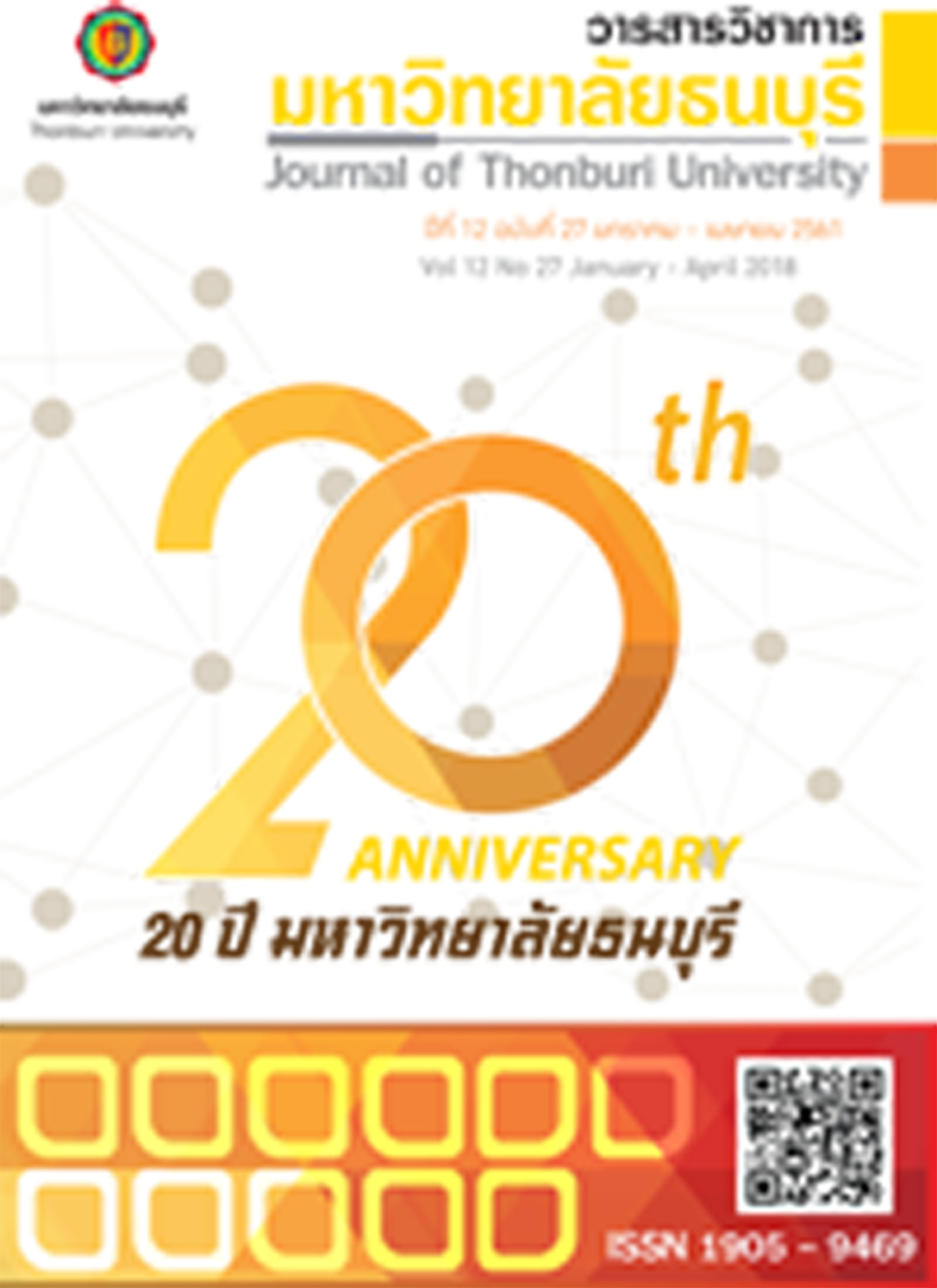ปัจจัยที่มีอิทธิพลต่อปริมาณเงินฝากในระบบธนาคารพาณิชย์ในประเทศไทย
Keywords:
ปริมาณเงินฝาก, ธนาคารพาณิชย์, เศรษฐกิจ, Deposit volume, commercial bank, economyAbstract
บทคัดย่อ
การวิเคราะห์ปัจจัยที่มีอิทธิพลต่อปริมาณเงินฝากในระบบธนาคารพาณิชย์ในประเทศไทย ช่วงระหว่างปี พ.ศ.2545 ถึง พ.ศ.2558 โดยมุ่งศึกษาถึงปัจจัยที่มีผลกระทบต่อปริมาณเงินฝากในระบบธนาคารพาณิชย์ในประเทศไทย (ADB) ได้แก่ ผลิตภัณฑ์มวลรวมภายในประเทศ (GDP), อัตราดอกเบี้ยเงินฝาก (DPR), จำนวนสาขาของธนาคารพาณิชย์ในประเทศ ไทย (NOB), ดัชนีราคาผู้บริโภค(CPI), อัตราเงินเฟ้อ (INF), ค่าเงินบาท (BAT), ปริมาณสินทรัพย์ (ASS), เครื่องเบิกถอนเงินสดอัตโนมัติ (ATM), อัตราผลตอบแทนสินทรัพย์เสี่ยงของตลาดทุน (CMR), ปริมาณเงินฝากในระบบบริษัทเงินทุน (VDF) และอัตราผลตอบแทนของพันธบัตรรัฐบาล (YGB) โดยทำการเก็บรวบรวมข้อมูลมาจากธนาคารแห่งประเทศไทย และสำนักงานสถิติแห่งชาติ
โดยผลของการวิเคราะห์ได้ดังนี้ คือ อัตราดอกเบี้ยเงินฝาก (DPR), จำนวนสาขาของธนาคารพาณิชย์ในประเทศไทย(NOB), ดัชนีราคาผู้บริโภค (CPI), ปริมาณสินทรัพย์ (ASS), อัตราผลตอบแทนสินทรัพย์เสี่ยงของตลาดทุน (CMR), ปริมาณเงินฝากในระบบบริษัทเงินทุน (VDF) และอัตราผลตอบแทนของพันธบัตรรัฐบาล (YGB) มีความสัมพันธ์กับปริมาณเงินฝากในระบบธนาคารพาณิชย์ในประเทศไทย (ADB) อย่างมีนัยสำคัญ โดยที่อัตราผลตอบแทนสินทรัพย์เสี่ยงของตลาดทุน(CMR), ปริมาณเงินฝากในระบบบริษัทเงินทุน (VDF) และอัตราผลตอบแทนของพันธบัตรรัฐบาล (YGB) มีความสัมพันธ์ทิศทางเดียวกันกับปริมาณเงินฝากในระบบธนาคารพาณิชย์ในประเทศไทย (ADB) คือเมื่ออัตราผลตอบแทนสินทรัพย์เสี่ยงของตลาดทุน(CMR), ปริมาณเงินฝากในระบบบริษัทเงินทุน (VDF) และอัตราผลตอบแทนของพันธบัตรรัฐบาล (YGB) ตัวใดตัวหนึ่งเพิ่มสูงขึ้นปริมาณเงินฝากในระบบธนาคารพาณิชย์ในประเทศไทย (ADB) จะเพิ่มขึ้นด้วย ส่วนตัวแปรอัตราดอกเบี้ยเงินฝาก (DPR), จำนวนสาขาของธนาคารพาณิชย์ในประเทศไทย (NOB), ดัชนีราคาผู้บริโภค(CPI) และปริมาณสินทรัพย์ (ASS) มีความสัมพันธ์ทิศทางตรงกันข้ามกับปริมาณเงินฝากในระบบธนาคารพาณิชย์ในประเทศไทย (ADB) คือเมื่ออัตราดอกเบี้ยเงินฝาก (DPR), จำนวนสาขาของธนาคารพาณิชย์ในประเทศไทย (NOB), ดัชนีราคาผู้บริโภค(CPI) และปริมาณสินทรัพย์ (ASS) เพิ่มสูงขึ้น ปริมาณเงินฝากในระบบธนาคารพาณิชย์ในประเทศไทย (ADB) จะลดลง
คำสำคัญ: ปริมาณเงินฝาก, ธนาคารพาณิชย์, เศรษฐกิจ
Abstract
This research was an analysis of factors affecting the deposit volumes in the commercial banking system in Thailand during 2002–2015. The purposes of the research were to study the factors affecting the deposit volumes in commercial banks in Thailand (ADB), namely gross domestic product (GDP), deposit interest rates (DPR), number of branches of commercial banks in Thailand (NOB), consumer price index (CPI), inflation rate (%) (INF), baht value (BAT), asset volume (ASS), automatic teller machine (ATM), risky asset return rate of capital market (CMR), deposit volumes in the system of financing companies (VDF), and the yield on government bonds (YGB). The research was conducted by collecting data from the Bank of Thailand and the National Statistical Office of Thailand.
The analysis results were as follows: The deposit interest rates (DPR), The number of branches of Thai commercial banks (NOB), consumer price index (CPI), asset volume (ASS), risky asset return rate of capital market (CMR), deposit volumes in the system of financing companies (VDF) and the yield on government bonds (YGB) were significantly associated with the deposit volumes in the commercial banking system in Thailand (ADB). Whereas the risky asset return rate of capital market (CMR), deposit volumes in the system of financing companies (VDF) and the yield on government bonds (YGB) were associated in the same direction with the deposit volumes in the commercial banking system in Thailand (ADB). When one factor of risky asset return rate of capital market (CMR), deposit volumes in the system of financing companies (VDF) and the yield on government bonds (YGB) has increased, the deposit volumes in the commercial banking system in Thailand (VDF) will increase similarly. In addition, the variables of deposit interest rates (DPR), number of branches of commercial banks in Thailand (NOB), consumer price index (CPI) and asset volume (ASS) were associated in the reverse direction with the deposit volumes in the commercial banking system in Thailand (ADB). Whereas the deposit interest rates (DPR), number of branches of commercial banks in Thailand (NOB), consumer price index (CPI) and asset volume (ASS) have increased, the deposit volumes in the commercial banking system in Thailand (ADB) will decrease correspondingly.
Keywords: Deposit volume, commercial bank, economy







